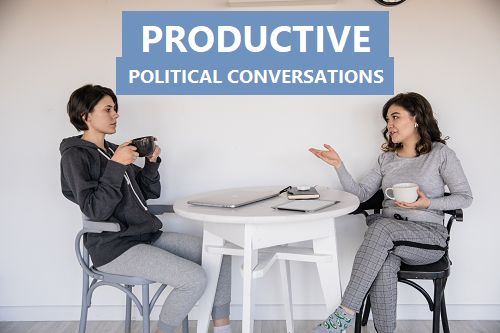Psychologist Karin Tamerius: Productive political convos
Jul 18, 2021 · 2 mins read
0
Share

When beginning a political conversation it's critical that you treat the other person the way you want to be treated. Respectful behavior, calm demeanor and active listening only happen if you exhibit them first.
Save
Share
Remember, people come to their political persuasions largely due to their environment. It is not who they are, but a reflection of their connections, media and community. Believe that change is possible.
Save
Share
Lecturing does not work. Facts and reason are highly overrated. Starting there will not lead to any success. Think of it like a "pyramid of persuasion". You have to build the lower levels of comfort, connection, comprehension, and compassion before cognition at the top.
Save
Share
Steps to Political Persuasion: Make people feel safe enough to talk. 1) Connect and defuse competition by forming an alliance. 2) Achieve a basic understanding by listening. 3) Offer compassion and empathy. 4) Then and only then offer reason and facts.
Save
Share
When people are triggered - furious, out of control, extreme rage - the frontal cortex of the brain shuts down. Empathy, planning, clear thinking and communication is no longer possible. In political conversations ensuring neither person is triggered is vital.
Save
Share
Liking is a fundamental principle. Behave in a way that makes people want to draw closer to you and not run away. Kindness goes a long way. Remember that likability is an important tool for persuasion and influence.
Save
Share
People have an innate desire to be consistent with their values and their views of who they are as a person. It creates a cognitive dissonance if you try to persuade them to a position that is antithetical to who they believe they are. It's important to illustrate alignment.
Save
Share
People want to feel empathized with. They want to feel seen, heard and cared about. When someone shows empathy, they become more influential because they're on your side. Emphasizing your similarities often helps create empathy and connection.
Save
Share
Bare in mind the ethics of influence: Ask yourself "how would I feel about this technique being used on me?" If you would be ok with it, then it's probably fine. If not, it may be more of manipulation and control which is unacceptable.
Save
Share
Suggested read: The Catalyst by Jonah Berger. It's on persuasion and influence and centers around not pushing people, but removing barriers (such as shame) and allowing people to come to their own conclusions.
Save
Share
0